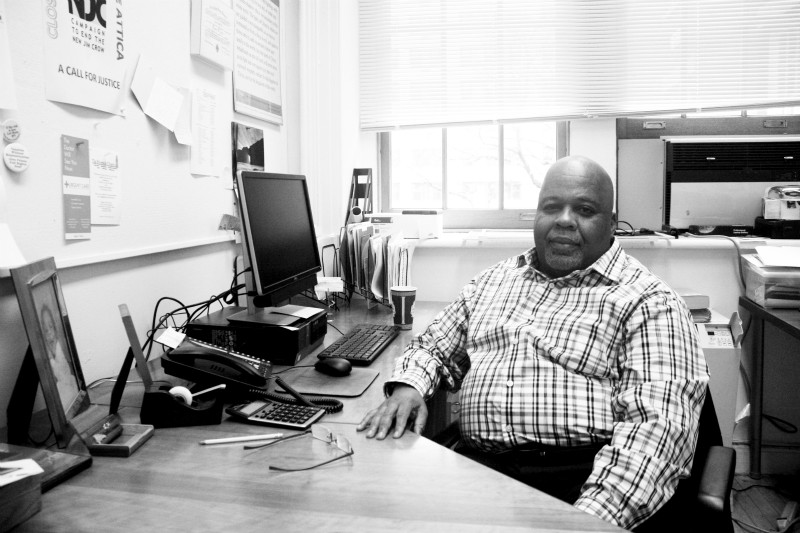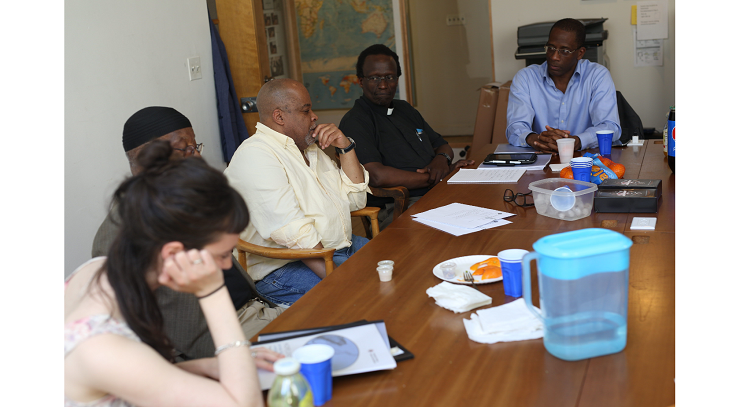
Lewis Webb at his office in New York City. Madeline Smith-Gibbs / AFSC
Note: Lewis provides sanctuary at AFSC's New York City office for currently and formerly incarcerated individuals, and provides safe space for young people in AFSC's Liberation Summer camp program who have a parent or sibling in prison. In this piece he reflects on what those spaces have meant for participants and for him. You can find part one here. – Christina
Often, you're only allowed to tell your story as a poster person and then you're pushed to the side while the academics and "experts" do the work. This space has provided a different approach: to engage every individual who has come with the opportunity, if they are inclined, to get involved. That's how you build a community of advocates.
When I joined the organization one of the first things I read was a statement written by someone within AFSC called In a Time of Broken Bones by Katherine Whitlock. She talked about the way the system breaks people by not only taking them away from society, but also by tearing them down as people without a plan to rebuild them. It’s from putting a number on their shirt and that's how they're identified inside. It's telling them that they're here because they're bad people and they need people who don't look like them to fix them. That's why we do healing justice, so they can be restored.

Part of the restoration demands comfort; you can't heal a broken bone if you use it and stress it. So if we're really about healing the brokenness that these systems have caused, then we've got to provide a space for that that isn’t tense or demanding. It has to be a space that provides support, but also steps back when they need to be alone. This can be difficult when you can see all their needs, but you have to understand that you're dealing with people who have fended for themselves in prison for so long that they have built up this wall, and sometimes they're not ready for you to chip at it.
Instead you just say, "there's a computer over there, I'll be in here. Knock on the door, come on in if you need me. If not, just let me know when you're leaving." And that's OK, because right now if it seems like that's what they need then to that degree we can provide that, and I really believe that promotes healing.
There was a documentary done about Larry White a week after he came home from prison, and I got to watch it. The man that was in that documentary is so different from the man you’ll meet today. Not just because of time – he's been home about seven years – but the self-esteem, the growth of his sense of self-worth, his sense of belonging somewhere again.

Russell Tucker has been amazing, too. I think he was inside for 23 years and out for six years, and maybe three months after he left prison he came here. But he couldn't find a job, and at that time he had an 8-year-old daughter who was trying to reconnect with him, but he didn't know how to do that. And so I’d say to Russell, "your daughter and my son are the same age, let’s go to Chuck E. Cheese." We've been able to share birthdays together and that wouldn't have happened if he didn’t come here to find sanctuary.
Larry is the one who recommended Russell come here. He’d told him, "they're not going to stretch you. If you want to try and redo your resume, they'll help you. If you just want to relax or to have lunch with us, that'll happen." Russell likes to eat, I don't know if he told you that. But he came, and we developed a friendship that I hope provides sanctuary for him. He's an amazing person. He’s gainfully employed serving others, and I want to believe at least in part it's because of the time he's spent here. I think he’s found something here that is healing for him.
Read more about how communities have taken steps to create Sanctuary Spaces here.
Related posts
Sanctuary Spaces: An introduction
Sanctuary Spaces: A place for healing from incarceration - part 1
Sanctuary Spaces: Pushing back oppressive systems from the inside out - part 1
Sanctuary Spaces: Pushing back oppressive systems from the inside out - part 2
A sanctuary atmosphere: creating safe, emotional and mental space for people in solitary